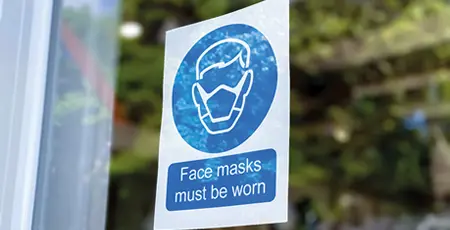Disconnect
More engaged scholarship is needed to help business become a force for good.
In my role as the Vice-Dean for Research within the Faculty of Humanities Leadership Team at The University of Manchester I was privileged to bring together our submission to the latest Research Excellence Framework (REF 2021) exercise.
This was for 20 of our University’s 31 subject areas (known as units of assessment), including business and management, which we returned to the UK government for evaluation.
It was a privilege because I could see the many different ways in which our varied schools, departments and institutes, spanning the full range of the humanities and the social sciences, had fostered research excellence and career development, and in so doing, generated impact of considerable reach and significance.
It was particularly gratifying to see first-hand how the numerous, diverse projects we had completed over the assessment period are tangibly benefiting society, both locally and globally, culturally enriching communities, enhancing the functioning of the economy, and promoting personal and social wellbeing.
Knowledge creation
As academics we should regularly remind ourselves that we are all similarly privileged, whatever our specific roles might be, in the contributions we variously make to the development and/or dissemination of the knowledge created through our scholarly endeavours.
However, as I stand back and reflect on the present state of the business and management field, from a perspective gained over the course of a career approaching 40 years, I am firmly of the view that knowledge creation for its own sake, although important, needs to be regarded more widely than it is presently within our business schools across the globe as but an intermediate step along a series of pathways that ensure the research we are undertaking makes a far richer and fuller contribution to the betterment of humankind.
For the avoidance of any doubt, I am not calling for the abandonment of pure research, which is essential to the vibrancy and sustainability of all spheres of scholarly activity, whatever the field or discipline. What I am saying, however, is that our business schools, collectively, need to centre the focus of their research activity far more than they do presently on the many and varied pressing challenges presently afflicting the world, but do so in ways that don’t compromise academic originality, significance and/or rigour, the hallmarks of world class research in all fields.
Presently, our business schools and business school-based researchers are over-incentivised to pursue theoretical and methodological rigour and advancement at the expense of engaging more deeply and meaningfully with the fundamental challenges of economy and society that are surely in dire need of such engagement.
The net result is that far too many of our best researchers are disengaged from the wider world they profess to study. Of course I am not the first, and unfortunately I suspect I won’t be the last, member of the management research community to make these observations.
There is a fundamental disconnection between the overwhelming bulk of the research published in our most highly prized academically focused research outlets and the communities that stand to benefit most from its insights.
A crisis of theory over production
The root of the problem that needs to be confronted, if business schools are to reimagine a future based on responsible research, I suggest, is a crisis of overproduction of management and organization theory of a form that is isolated from the fundamental problems confronting the workplace that are crying out for deeper scholarly attention.
Over the past two decades a long list of leading figures have lamented the disturbing trend that is so evident in our field, relative to the many disciplines I have been privileged to have had oversight of over the past five years, of over-emphasising the role and importance of theory. Unfortunately, this trend is continuing unabated. Indeed, we have reached the stage where even some of the field’s leading research methods journals are rejecting manuscripts that report methodological advances in the absence of theory advancement! I know of no other field or discipline that behaves in this bizarre fashion.
To be absolutely clear, I am not calling for the abandonment of theory advancement but I am calling on our research community writ large to gain a fresh sense of priority at this critical juncture.
Disconnect
In sum, there is a fundamental disconnection between the overwhelming bulk of the research published in our most highly prized academically focused research outlets and the communities that stand to benefit most from its insights.
Of course, there is an obvious retort that all theories are potentially useful for advancing the betterment of humankind and that what we ultimately lack is a sufficient number of skilled knowledge brokers or knowledge intermediaries to communicate the tangible benefits of our research to the wider publics who stand to benefit from them.
Although it is true that our field would benefit from more intermediaries, this will not address the more fundamental root of the problem I, among many other members of our profession, have outlined.
On the contrary, we need to reflect far more deeply on how we have arrived at this, frankly, perverse situation in which we find ourselves, whereby we have an over-abundance of theory production, yet so much of the theory we are producing in our most prestigious outlets is failing to gain reach and/or significance beyond the narrow confines of our own academic community because it is simply not accessible enough for wider stakeholders to make use of, not least the very actors whose working lives we study.
Addressing the impasse
Two major developments have occurred over recent years that have created the enabling conditions to address this impasse, and the momentum for doing so is rapidly gathering pace.
First, the redesign of our national research evaluation programme from its forerunner the Research Assessment Exercise (RAE) to the modern-day REF introduced the fundamental requirement for all subject areas to demonstrate the wider impact of their research.
Unfortunately, however, following two rounds of the REF, it is clear that although there are some isolated examples of research that is both academically excellent and has had major social and economic impact, there is still a huge gap, more generally, between business schools’ notions of research that is of the highest originality, significance, and rigour, and practitioners’ and policy makers’ notions of research excellence.
Business Schools over two successive exercises that were highly ranked for the quality of their outputs were not typically ranked anywhere nearly as highly for the quality of their impact case studies. Conversely, many of our business schools that were scored highly in terms of the reach and significance of their impact case studies fared rather badly in the evaluation of the quality of their published outputs.
These results provide clear evidence that the quality of peer reviewed published research generated by our business schools is negatively correlated with the reach and significance of its impact on the wider world, which is why we need to reform more fundamentally the business and management research ecosystem.
Vision
The growing community of scholars known as Responsible Research in Business and Management (RRMB) www.rrbm.network was founded precisely to address this very challenge. Over the course of just eight years the RRMB community has grown from an initial group of 28 founders to a staggering 1,000+ signatories.
Its position paper, A Vision of Responsible Research in Business and Management: Striving for Useful and Credible Knowledge, published in 2017, outlines a compelling vision to transform our field "toward responsible science, producing useful and credible knowledge that addresses problems important to business and society... based on the belief that business can be a means for a better world if it is informed by responsible research."
It is a vision I am proud to embrace and a community of which I am proud to be a member. In closing, perhaps I should point out that the ‘original thinking applied’ motto of Alliance Manchester Business School perfectly encapsulates this ethos.
Gerard P Hodgkinson is Professor of Strategic Management and Behavioural Science at Alliance Manchester Business School and the immediate Past Vice-Dean for Research of the Faculty of Humanities at the University of Manchester. The views expressed in this article are his own, writing in a personal capacity.





